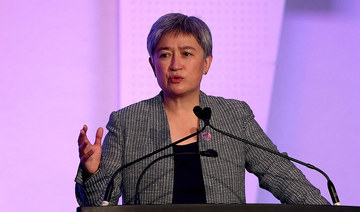PARIS: Sorrow for the dead and dying, fear of more infections to come and hopes for an end to the coronavirus pandemic were — again — the bittersweet cocktail with which the world said good riddance to 2021 and ushered in 2022.
New Year’s Eve, which used to be celebrated globally with a free-spirited wildness, felt instead like a case of deja vu, with the fast-spreading omicron variant again filling hospitals.
“We just need enjoyment,” said Karen Page, 53, who was among the fed-up revelers venturing out in London. “We have just been in so long.”
The mostly muted New Year’s Eve celebrations around the world ushered in the fourth calendar year framed by the global pandemic. More than 285 million people have been infected by the coronavirus worldwide since late 2019 and more than 5 million have died.
In Paris, officials canceled the fireworks amid surging infections and reintroduced mandatory mask-wearing outdoors, an obligation followed by the majority of people who milled about on the Champs-Elysées as the final hours of 2021 ticked away.
In Berlin, police urged people not to gather near the Brandenburg Gate, where a concert was staged without a live audience. In Madrid, authorities allowed only 7,000 people into the city’s Puerta del Sol downtown square, a venue traditionally hosting some 20,000 revelers.
In the United States, officials took a mixed approach to the year-end revelry: nixing the audience at a countdown concert in Los Angeles, scaling it back in New York yet going full speed ahead in Las Vegas, where as many as 300,000 people were expected to shrug off gusty winds and turn up for a fireworks show on the strip.
President Joe Biden noted the losses and uncertainty caused by the pandemic but said: “We’re persevering. We’re recovering.”
“Back to work. Back to school. Back to joy,” Biden said in a video posted on Twitter. “That’s how we made it through this year. And how we’ll embrace the next. Together.”
In New York, officials allowed just 15,000 people — vaccinated and masked — inside the perimeter around Times Square, a sliver of the 1 million that typically squeeze in to watch the famed ball drop. Outgoing Mayor Bill de Blasio, defending the event, said people need to see that New York is open for business.
Yet by Thursday, rapper LL Cool J had dropped out of the New York telecast after a positive COVID-19 test and restaurant owners battered by staffing shortages and omicron cancelations throughout the holiday season struggled to stay open.
“I’m really scared for our industry,” said New York restaurateur David Rabin, who watched reservations and party bookings disappear this month. “No one made any money in December. The fact they may have a good night tonight, it has no impact.”
Airlines also struggled as the year came to a close, canceling thousands of flights after the virus struck flight crews and other personnel and amid bad weather.
The pandemic game-changer of 2021 — vaccinations — continued apace. Pakistan said it had fully vaccinated 70 million of its 220 million people this year and Britain said it met its goal of offering a vaccine booster shot to all adults by Friday.
In Russia, President Vladimir Putin mourned the dead, praised Russians for their strength in difficult times and soberly warned that the pandemic “isn’t retreating yet.” Russia’s virus task force has reported 308,860 COVID-19 deaths but its state statistics agency says the death toll has been more than double that.
“I would like to express words of sincere support to all those who lost their dear ones,” Putin said in a televised address broadcast just before midnight in each of Russia’s 11 time zones.
Elsewhere, the venue that many chose for New Year’s celebrations was the same place they became overly familiarly with during lockdowns: their homes.
Pope Francis also canceled his New Year’s Eve tradition of visiting the life-sized manger set up in St. Peter’s Square, again to avoid a crowd. In an unusual move for Francis, the 85-year-old pontiff donned a surgical mask for a Vespers service of prayer and hymns Friday evening as he sat in an armchair. But he also delivered a homily standing and unmasked.
“A sense of being lost has grown in the world during the pandemic,’’ Francis told the faithful in St. Peter’s Basilica.
France, Britain, Portugal and Australia were among countries that set new records for COVID-19 infections as 2021 gave way to 2022.
In London, the normal fireworks display, which would have attracted tens of thousands of people to the city center and the banks of the Thames, was replaced by a light and drones show broadcast on television. Location details about the spectacle were kept secret in advance to avoid crowds gathering.
“The last two years have been so difficult for so many people, so many have suffered and there is a point when we need to start coming together finally,” said Mira Lluk, 22, a special needs teacher.
France’s unprecedented 232,200 new cases Friday marked its third day running above the 200,000 mark. The UK was close behind, with 189,846 new cases, also a record. In London, officials said as many as 1 in 15 people were infected with the virus in the week before Christmas. Hospitalizations of COVID-19 patients in the UK rose 68 percent in the last week, to the highest levels since February.
In Brazil, Rio de Janeiro’s Copacabana beach welcomed a small crowd of a few thousand for 16 minutes of fireworks. Rio’s New Year’s bash usually brings more than 2 million people to Copacabana beach. In 2020 there was no celebration due to the pandemic. This year there was music on loudspeakers, but no live concerts like in previous editions.
Yet boisterous New Year’s Eve celebrations kicked off in the Serbian capital of Belgrade where, unlike elsewhere in Europe, mass gatherings were allowed despite fears of the omicron variant. One medical expert predicted that Serbia will see thousands of new COVID-19 infections after the holidays.
At Expo 2020, the sprawling world’s fair outside Dubai, 26-year-old tourist Lujain Orfi prepared to throw caution to the wind on New Year’s Eve — her first time ever outside Saudi Arabia, where she lives in the holy city of Medina.
“If you don’t celebrate, life will pass you by,” she said. “I’m healthy and took two (vaccine) doses. We just have to enjoy.”
Australia went ahead with its celebrations despite reporting a record 32,000 new cases. Thousands of fireworks lit up the sky over Sydney’s Harbor Bridge and Opera House at midnight. Yet the crowds were far smaller than in pre-pandemic years.
In Japan, writer Naoki Matsuzawa said he would spend the next few days cooking and delivering food to the elderly because some stores would be closed. He said vaccinations had made people less anxious about the pandemic, despite the new variant.
“A numbness has set in, and we are no longer overly afraid,” said Matsuzawa, who lives in Yokohama, southwest of Tokyo. “Some of us are starting to take for granted that it won’t happen to me.”
South Korean authorities closed many beaches and other tourist attractions along the east coast, which usually swarm with people hoping to catch the year’s first sunrise.
In India, millions of people rang in the new year from their homes, with nighttime curfews and other restrictions taking the fizz out of celebrations in New Delhi, Mumbai and other large cities.
In mainland China, the Shanghai government canceled an annual light show along the Huangpu River that usually draws hundreds of thousands of spectators. There were no plans for public festivities in Beijing, where popular temples have been closed or had limited access since mid-December.
In the Philippines, a powerful typhoon two weeks ago wiped out basic necessities for tens of thousands of people ahead of New Year’s Eve. More than 400 were killed by Typhoon Rai and at least 82 remain missing.
Leahmer Singson, a 17-year-old mother, lost her home to a fire last month, and then the typhoon blew away her temporary wooden shack in Cebu city. She will welcome the new year with her husband, who works in a glass and aluminum factory, and her 1-year-old baby in a ramshackle tent in a clearing where hundreds of other families erected small tents from debris, rice sacks and tarpaulins.
Asked what she wants for the new year, Singson had a simple wish: “I hope we won’t get sick.”








































